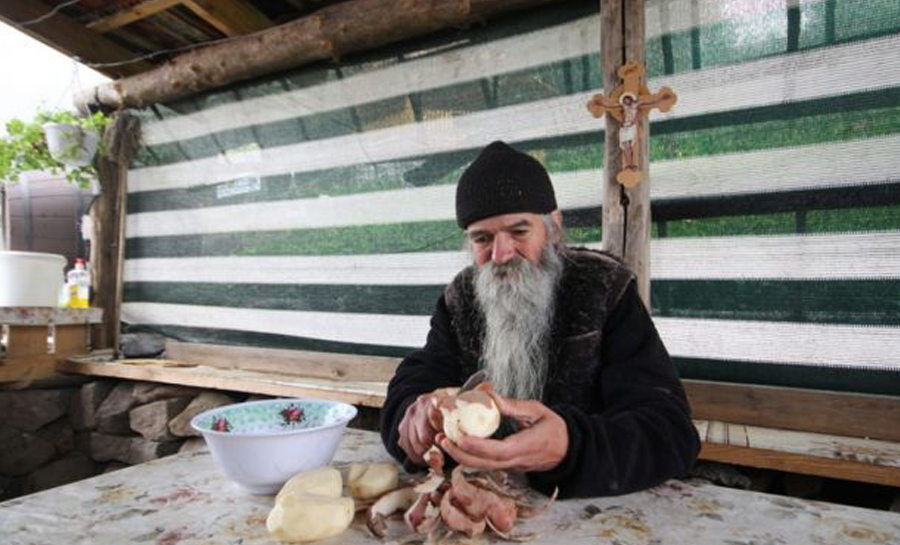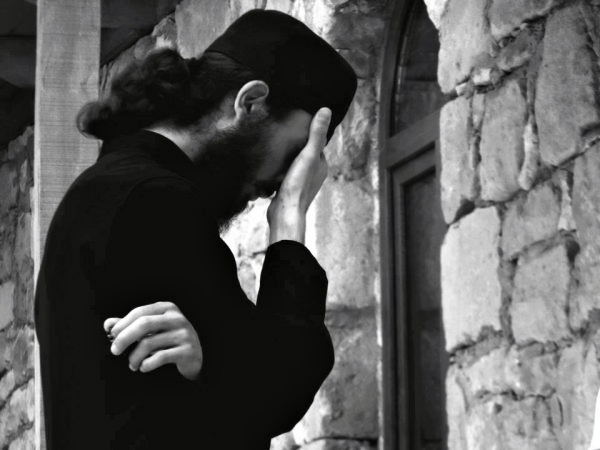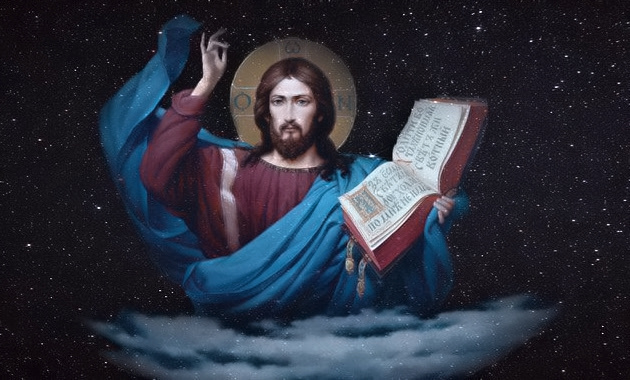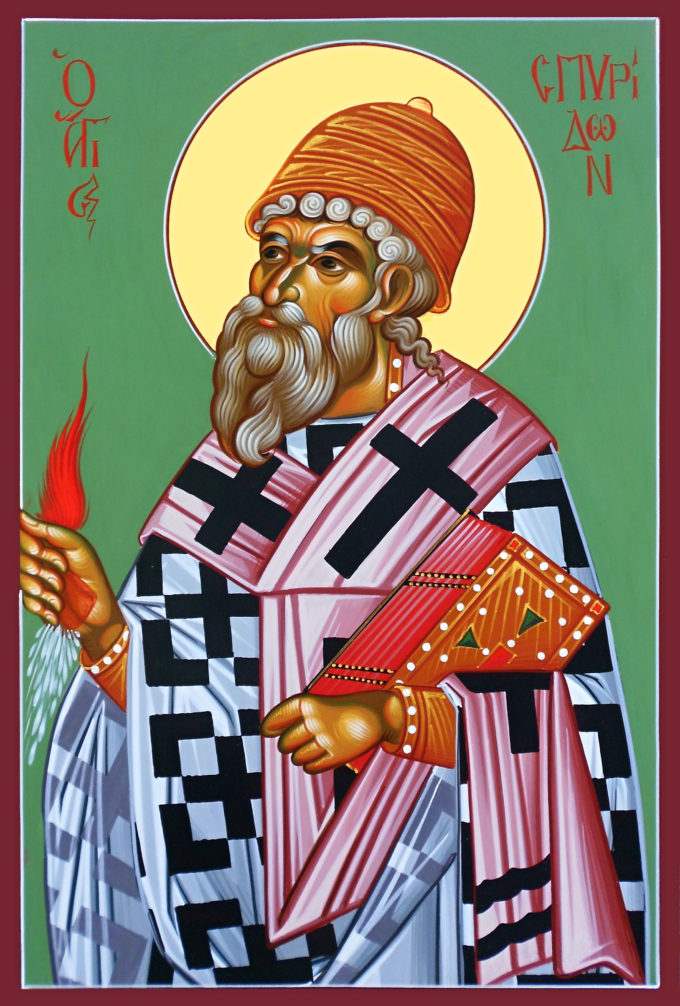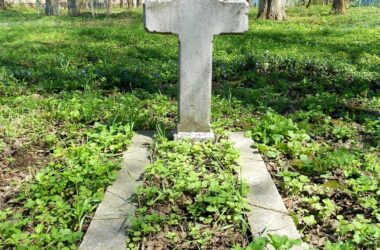From his youth saint Pahomius’s heart burnt of love for God and he wished to become a monk. Finding out about a hermit called Palamon, who lived in seclusion, he went to that one wanting to stay with him. When he reached his cell, not far from the desert he knocked at the door. That one opening the door a little said: What do you want and who are you looking for? because after his long ascetic struggles the elder was very tough. And Pahomius said: God sent me to you to make me a monk.
The elder told him: You can’t be a monk, because the work f the monk is hard. That is why many came here but they were bent by hardships and they didn’t endure. Pahomius said: `Not all people have the same determination. Accept me and you will see.`I told you that you can’t.` the elder said. `Go somewhere else and struggle for a while then come back and I’ll receive you. Here I’m living a severe ascetic life and by the grace of God I don’t eat anything else except bread and salt. I refrain from oil and wine completely. I keep vigils for half of the night – and sometimes even the whole night – spending my time in prayers and studying the words of God.
- From the life of saint Pahomius
Pahomius hearing these and accepting piously the toughness of those words decided in the depth of his soul to endure all strives with the help of the divine grace and said to the elder:
`I believe that God will give me power and patience so that I become worthy to settle here with the help of your prayers.` Then saint Palamon seeing with the sharp eye of his mind Pahomius’s faith and his zeal for salvation opened the door for him and clad him in the monachal schema.
Since then they spent their time striving and praying together. They spinned wool and wove sacks. They worked with zeal, as the Apostle says, but not for their comfort or for gathering money but for feeding the poor. And Palamon seeing Pahomius’s s obedience in everything rejoiced and glorified God.
- From the same’s life
Saint Pahomius ceaseless prayer was to be accomplished the will of God with him. And after some time while he kept a vigil and was praying an angel from God showed up and said:`The will of God is to serve him and reconcile mankind with Him. And repeating this for three times he left him. Then Pahomius thanked God and being convinced by the vision he had he started to receive those who came to God out of repentance. And he gave them the monachal schema after many trials stopping them from the worldly things and leading them slowly to ascetic struggle.
From the life of Pious Theodora
Blessed Theodora thinking to leave the world and everything belonged to it and to cheat with wise thoughts the one who had deluded her, she dressed as a man – to hide from the man who was to look for her insistently – and went to a monastery for monks located at 18 km from Alexandria.
Reaching the gate she asked to be received inside and accepted as a mok among the others. But the monks who thought she was a man not a woman told her they wouldn’t have received her if she hadn`t stayed under the open sky and proving in this way to the brothers her strength. And she gladly accepted what they asked – even if she knew that there were many wild beasts coming out at night, the place being desert and wild – but she followed the order and spent her night waiting in front of the gate. That is why God who erstwhile tamed the cruelty of the lions for Daniel, protected her unharmed by beasts knowing beforehand what heights f virtue she could reach. And the monks understood after this trial that it pleased God to let her stay in their monastery.
After she was gladly received there the abbot taking her aside asked her in detail about her identity and about the reason of her coming to the monastery.
`Have you chosen to leave the world being burdened by debts and loans or were you caught committing a murder or you could not feed your children?`
`None of these is my reason, father, said Theodora. I only wanted to find my peace away of the noise of the world and to cry for my sins.
`What is your name?` asked the elder.
`Theodore is my name`.
`Do not imagine that here you will live without painstaking, brother Theodore. But if you really want to take the yoke of obedience know that you will serve your brothers in all their needs, not only in those from the monastery – where you must take care of the seedlings and greens, bring the water and wet the garden in time – but also in the chores from outside. If it is necessary to go in the city you will do it. And these will not be reasons for neglecting ascetic struggle so you will have to keep on praying and fasting without cease, to sing psalms and make your daily prayers in the morning and in the evening. And you won’t neglect any of the Hours. And you will make prostrations, exhausting your body because of the scheming of the enemies who come through it.
The blessed listened to all these carefully and considering all of them a spiritual delight promised to accomplish them with great zeal. And in this way she came to belong to that worthy community of monks. And because her promises to God were true she took farewell from all the fleshly thoughts and prepared herself for strives, without any trace of idleness or anything else which could impede her ministration. She spent in this way eight years taking care of the seedlings and greens necessary for the monastery. Every day she worked hard to the grinding of the wheat, to the kneading of the dough and to the baking of the bread. Then she cooked the greens those monk ate to kill their bodies. And she never missed a holy service in the church but there she proved at her most her love for God.
But despite the fact that she lived in that way and she had chosen a painstaking life the thought of her previous mistake troubled her. After all those chores when the night fell although she should have slept to have a moderate rest she hit her chest and cried saying: God forgive my sin that took the good face of my virtue.`
She also did all the shopping buying the oil, the wheat and everything was necessary for the monastery and carried them with the camels. Briefly saying there was no chore where Theodora wouldn’t have proven more zeal than all the others.
[i] day – shape, form, appereance, usually clothes. The word is used for the monachal robe and for the monachal life in general (the one who takes the shema is the one who becomes a monk, who receives the monachal order; from here comes the expression `he has so many years in schema).
[ii] And we work hard with our hands (I Co. 4,12)
[iii] it refers at the devil. Theodora was a married Christian woman from Alexandria. A rich man fell in love with her and succeeded to make her sin. After the adultery Theodora decided to repent for her sin in the way it was described above
[iv] The Hours (rQoec;) – short holy services during the day (The 1st, 3rd, 6th 9th Hour), called in this way after the Byzantine hour. Initially the monachal rules were adopted by the worldly ordinary fact that led to their unification with other services from the seven praises
(1st Hour after Matins, 3rd and 6th Hour before the Liturgy and the 9th Hour before Vespers).
[v] Litt. „took off clothes”. Allusion at the athelete who took off his clothes before the fight in the same way the ascetic takes off everything can be an obstacle on the path of godliness.
[vi] the ascesis of the holy fathers is called mortification of the soul matter that must be understood wisely. Fasting vigils, abstinence, prostrations and all the other strives have as purpose the liberation of physical passions this being the only reason for the struggle
Excerpt from EVERGHETINOS – bilingual edition 2010 Holy Monastery Vatoped vol. II, Theme 26

